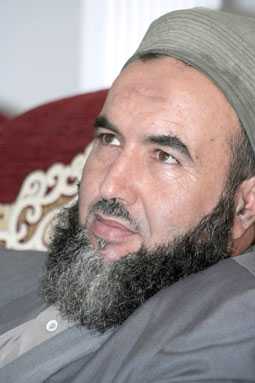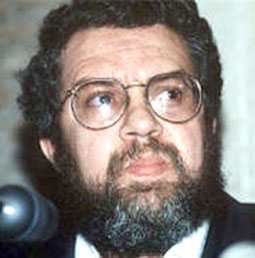From the Wall Street Journal. Req's registration. Posted in full. DeVillepain hopes to control flood of jihad-supporting funds from abroad (read Saudi Arabia, among others), but this conflicts with the government's desire to generate business with those countries, a difficult dilemma.
Money is the oil of ideological warfare. With fortunes, one can buy and corrupt the souls of the faithful. Like other Western societies, France is discovering that it lets cash gush uncontrolled into its mosques and charities at its own peril.
So last week Interior Minister Dominique de Villepin announced the creation of a state-supervised "Foundation for Islam in France." By next April, this institution will manage financial contributions from Muslims abroad. The European Court of Justice forbids EU countries from blocking the flow of donations, wherever they come from. The idea here is not to stop the money from getting to France from the Muslim world, but to better regulate it -- to separate the wheat from the chaff, distinguish support for legitimate educational and religious causes from support for jihad.
For too long, radicals in the Middle East and beyond have been able to spread their views in a free and open Europe. Islamist groups hand out poisonous gifts to Muslim associations that, often penniless, accept them without asking too many questions. The problem is that those who hand out the money end up with control of Muslim organizations and mosques in France.
Until now, the French state had handled cases one by one. By coincidence, two advisers to the interior minister had an appointment at the Saudi Embassy in Paris on the morning of Sept. 11, 2001, to discuss support given by the Al-Haramein Foundation to a Paris mosque. Since then, the U.S. has blacklisted Al-Haramein for its links to al Qaeda. That's good tactics, but not much of a strategy.
* * *
France has recognized the challenge posed by violent Muslim fundamentalists in at home since a series of terrorist attacks in Paris in the mid-1990s. Now Spain, after the Madrid train bombings, and the Netherlands, after last month's murder of Theo van Gogh, are also moving more seriously against this threat. But why do all these European countries meet difficulties in putting in place their ambitious plans? Simply put, the fight against the Islamists often comes into direct conflict with other government priorities.
Let's take the example of Saudi Arabia and France. For nearly a decade, Paris has been negotiating a â¬7 billion contract with Riyadh to provide the kingdom with border-protection services. French authorities are clearly wary of spitting on such a market and the jobs that would come with it by seeming to be overly critical of foreign sponsors of domestic Muslim groups. No senior French politician will ever criticize King Fahd or Crown Prince Abdullah for allowing stoning in Saudi Arabia. In fact, in October 2002, then-Interior Minister Nicolas Sarkozy -- a politician to whom a great future has been promised -- received with great honors the general secretary of the Islamic World League, Abdullah al-Turki, a supporter of the fundamentalist Wahhabi strain of Islam that holds Western values in contempt and whose dream is to introduce Sharia law to the heart of Europe.
In most EU countries, foreign policy seems to set the agenda for interior security policy. The idea of a "French Islam," constantly put forward by the government, is a vast masquerade. Though it would be absurd and criminal to regard French Muslims as some sort of a fifth column, it remains a problem that every Muslim institution in France has links with foreign powers, and, more often than not, tight ones. France has believed for too long that it could let the countries of origin keep their emigrant communities under their control. At the headquarters of Muslim organizations in France, businessmen, diplomats and secret agents from the Middle East and North Africa -- where most French Arabs hail from -- are omnipresent.
Forget abstractions. Facts have to be addressed. Consider France's two biggest Muslim organizations, which are regarded as "fundamentalist" by intelligence services. The religious affairs attaché at the Saudi Arabian Embassy long behaved like a tutor for the leaders of the Union of Islamic Organizations of France (UOIF), not hesitating to "frequently bring them back to the path of rigor," according to a report from the French secret services. The UOIF relies on Persian Gulf states for its financial survival, and on Sheik Qardawi, the radical who preaches on al-Jazeera, for its theological guidance.
The other large group, the National Federation of Muslims in France (FNMF), which won the most votes in the 2003 election held in mosques for the new French Muslim council, is intimately linked to Morocco. Agents of His Majesty in Rabat try to play the puppet masters, as people familiar with that organization have noticed. Recently, the president of the federation, sent by France to Iraq to help with the ultimately unsuccessful attempt to free two French journalists taken hostage there, committed the mistake of visiting a hotel in Doha to kiss the forehead of Abassi Madani, the founder of the Algerian Islamic Front of Salvation, the ultra-radical movement. To the government in Algiers, it seemed as if this Frenchman of Moroccan origin, one of the most important representatives of "French Islam," had somehow wished to irritate them and show favor to Rabat.
* * *
More "moderate" federations are no different. The government in Ankara runs and holds the purse strings for the Turkish-Islamic Union of Theological Affairs (DITIB), the main organization for Muslim Turks in France.
At the Paris Mosque, the oldest and most venerable institution of Islam in France, Algeria remains the lord of the land. The Algerian regime achieved a sort of associative "coup" when it took over the place in 1982. "We are at home here," the former French colony's religion minister said back in 1989. Since 2003, the mosque's rector, Dalil Boubakeur, has presided over the council that represents Islam in France. But until a few years ago, a colonel from the Algerian military security services was writing, or at least controlling, some of his speeches.
This is the reason it is so difficult for France to cut off the pipelines of shadowy money from the Arab world. The creation of the foundation is merely another half-measure by a government only half-committed to fight this menace. By wishing to avoid any quarrel, successive governments have allowed a threat to the Republic to grow unchallenged on its own territory. Dominique de Villepin's entourage insists that foreign countries are interested in the foundation he is planning. And delegates from the French state will sit on its administration board. But it will take a constant and flawless will to prevent France from being contaminated yet again by the disease of Islamism. Placebos aren't enough to eradicate epidemics.
Mr. Deloire, a journalist at the Paris-based weekly Le Point, and Mr. Dubois, of the daily Le Parisien, are authors of "Les Islamistes Sont Déjà Là " (Albin Michel, 2004). |
 ...an emirate on the east coast of the Arabian Peninsula. It sits on some really productive gas and oil deposits, which produces the highest per capita income in the world. They piss it all away on religion, financing the Moslem Brotherhood and several al-Qaeda affiliates. Home of nutbag holy manYusuf al-Qaradawi...
...an emirate on the east coast of the Arabian Peninsula. It sits on some really productive gas and oil deposits, which produces the highest per capita income in the world. They piss it all away on religion, financing the Moslem Brotherhood and several al-Qaeda affiliates. Home of nutbag holy manYusuf al-Qaradawi...
 Bouteflika
Bouteflika [Ennahar] Algerian Islamists have tried unsuccessfully to be added to the new revolt that has shaken Algeria since 5 January, when they had reached the peak of their popularity after the deadly riots of October 1988.
[Ennahar] Algerian Islamists have tried unsuccessfully to be added to the new revolt that has shaken Algeria since 5 January, when they had reached the peak of their popularity after the deadly riots of October 1988. [Maghrebia] In response to a request by Algeria, the UN on Monday (July 27th) suspended the consultative status of the Paris-based
[Maghrebia] In response to a request by Algeria, the UN on Monday (July 27th) suspended the consultative status of the Paris-based 
 We met former leading member of
We met former leading member of  called on Bouteflika to declare a comprehensive amnesty and "free prisoners, chiefly the honorable
called on Bouteflika to declare a comprehensive amnesty and "free prisoners, chiefly the honorable